
Rohingya refugees: what can MSF do?
Emilie Medeiros, Eloïs Voisin & Raphaël Torlach
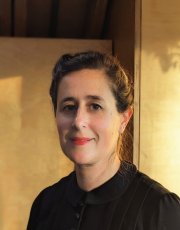
Emilie Medeiros est psychologue clinicienne et titulaire d'un doctorat en anthropologie psychologique. Elle est la fondatrice de Manas, qui vise à fournir des éléments de compréhension sur les dimensions psychologiques de la production des violences de masse. Elle est l’une des principales autrices d’un rapport de recherche sur les conséquences physiques et psychosociales à long terme des violences sexuelles et sexistes génocidaires commises par l’armée du Myanmar à l’encontre des Rohingyas lors de sa campagne de 2017.
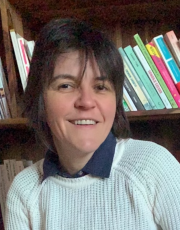
Dr Eloïs Voisin est sociologue, affilié au Centre de recherche des études sociologiques et politiques de Paris. Ses recherches portent sur les violences de genre à l’encontre des Rohingyas en Birmanie/Myanmar, en Malaisie et au Bangladesh, dans le contexte des migrations forcées et des situations humanitaires. Eloïs a été responsable de mission à Médecins du Monde (2020-2023) pour les projets de l’organisation au Bangladesh et est l’auteur de « As Husband I must be violent », un article portant sur le continuum de la violence dans les migrations forcées et les politiques militarisées.
Raphaël Torlach est un ancien chef de mission de MSF au Bangladesh, où il a supervisé les projets de l’organisation pour les Rohingyas pendant un an jusqu’en janvier 2024. Raphaël a rejoint MSF en 2015.
On Thursday, April 4, 2024 at 6:30pm, the CRASH team welcomed Emilie Medeiros, Eloïs Voisin and Raphaël Torlach for a conference/debate on the situation of the Rohingya refugees in Bangladesh.
Since the late 1970s, the Rohingya Muslim minority has been subject to waves of repression and violence, forcing them to flee repeatedly to neighboring Bangladesh. In 2017, more than 700,000 Rohingya found refuge in Cox's Bazar district, following a military campaign of unprecedented intensity; they joined more than 200,000 refugees from previous exoduses. By 2023, there were more than a million refugees, spread across a myriad of camps in the south of the country, including the world's largest refugee camp. This population represents more than a third of the total Rohingya population, which is divided between Malaysia, India, Pakistan, Saudi Arabia and Myanmar.
Deprived of their nationality by the Burmese government, prevented from integrating into Bangladesh and facing xenophobia from the government, victims of politico-criminal groups in the camps and suffering a rapid decline in humanitarian funding, the future of the Rohingya is in doubt. Are the Rohingyas threatened with extinction? The characterization of their situation is a matter of debate: Gambia has submitted an originating application to the International Court of Justice in November 2019, alleging that the Myanmar army committed genocidal acts as part of the military operations launched in October 2016 and August 2017 in Rakhine State. For some, the genocide continues. For others, it is the dilution of their identity that is the central issue for the Rohingya people, whom the Burmese authorities are turning into non-natives to be sent home.
MSF has been working with the Rohingya population since the late 1970s, not only in Bangladesh but also in Myanmar and Malaysia. From 2017 through 2023 MSF dedicated € 233 million to Rohingya medical and humanitarian projects. Yet its capacity to take care of the health needs of this population is clearly insufficient, as is that of a humanitarian system unable to do better than the biological survival of this population.
Dr Emilie Medeiros is a clinical psychologist and holds a PhD in Psychological Anthropology. She is the founder of Manas, which aims to provide insights into the psychological dimensions of the production of collective violence. She is one of the lead authors of a research report on Long-Term Physical and Psychosocial Consequences of Genocidal Sexual and Gender-Based Violence the Myanmar Military Committed against the Rohingya in its 2017 ‘Clearance operation’ campaign.
Dr Elois Voisin is a sociologist, affiliated to the Centre de recherche des études sociologiques et politiques de Paris. Their current and past research focuses on gender-based violence against Rohingyas in Burma/Myanmar, Malaysia and Bangladesh, in the context of forced migration and in humanitarian situations. Eloïs was Responsible de Mission at Médecins du Monde (2020-2023) for the organisation’s projects in Bangladesh and is the author of “As Husband I must be violent”, an article focusing on the continuum of violence in forced migrations and militarized policies.
Raphaël Torlach is a former Head of mission of MSF in Bangladesh, where he supervised the organization's projects for Rohingya during a year until January 2024. Raphaël joined MSF in 2015.
To cite this content :
Emilie Medeiros, Eloïs Voisin, Raphaël Torlach, “Rohingya refugees: what can MSF do?”, 4 avril 2024, URL : https://msf-crash.org/en/conferences-debates/rohingya-refugees-what-can-msf-do
If you would like to comment on this article, you can find us on social media or contact us here:
Contribute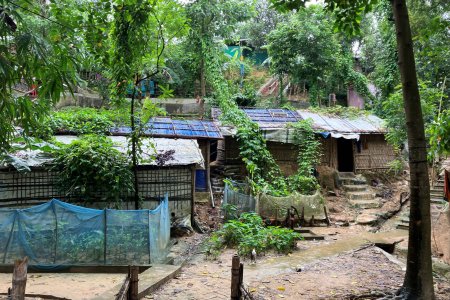 Michaël Neuman
Opinion
Michaël Neuman
Opinion
In Cox’s Bazar
10/31/2023 Michaël NeumanThis article was published in the London Review of books website on September 8, 2023. The former evokes the dire conditions in which roughly 1 000 000 Rohingyas live in Cox’s Bazar, the largest refugee camp in the world. In this coastal district in south-east Bangladesh, the humanitarian deployment is impressive, but commitment by donors is waning. Between March and June, monthly food allocations fell from $12 to $8 per person. The difficulties of accessing care, the social control to which they are subjected and the lack of prospects are many reasons explaining the perils faced by the Rohingya population.
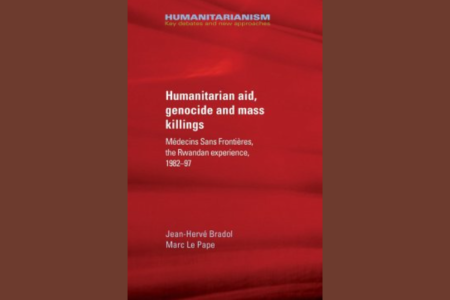 Book
Book
Humanitarian aid, genocide and mass killings. Médecins Sans Frontières, the Rwandan experience, 1982-97
11/04/2016 Jean-Hervé Bradol Marc Le PapeThroughout the 1990s, Médecins Sans Frontières (MSF) was forced to face the challenges posed by the genocide of Rwandan Tutsis and a succession of major outbreaks of political violence in Rwanda and its neighbouring countries.
Past events
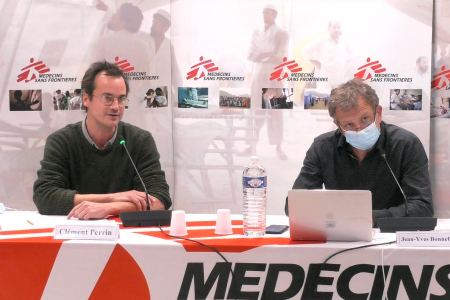 Conference
Conference
Another approach to well-being at work
12/09/2021 - 06:30 PM 08:30 PM Yves Clot Jean-Yves BonnefondThe members of the Crash were very happy to welcome you all to this new conference-debate with occupational psychologists Yves Clot and Jean-Yves Bonnefond, two of the authors of “Le prix du travail bien fait – La coopération conflictuelle dans les organisations” (Paris, La Découverte, 2021 ; co-written with Antoine Bonnemain and Mylène Zittoun).
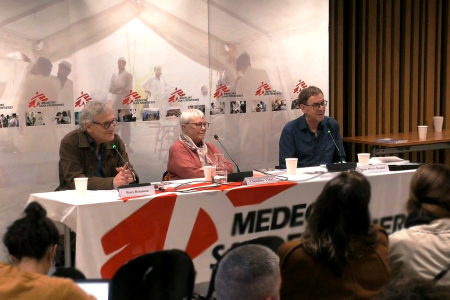 msf
Conference
msf
Conference
Book launch event - Violences extrêmes. Enquêter, secourir, juger République démocratique du Congo, Rwanda, Syrie
11/17/2021 - 06:30 PM 08:30 PM Jean-Hervé BradolWe were very happy to welcome two authors of the book: sociologist (CNRS) and Crash scientific committee member Claudine Vidal, and Jean-Hervé Bradol, doctor, former President of the French section of MSF and current director studies at the Crash, for the launching event of the newly-published book “Violences extrêmes. Enquêter, secourir, juger République démocratique du Congo, Rwanda, Syrie” (Éditions de la Maison des sciences de l’homme, Paris 2021). The event was hosted by Rony Brauman.
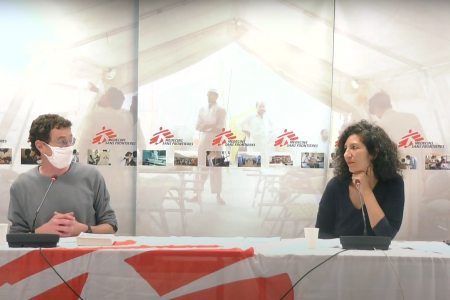 Conference
Conference
Asylum and exile. A history of the distinction between migrants / refugees
04/12/2021 - 06:30 PM 08:30 PM Karen AkokaOn April 12 2021 we had the great pleasure of hosting a virtual CRASH conference with political scientist and sociologist Karen Akoka, fresh from her publication in November of “Asylum and Exile. A History of the Refugee/Migrant Distinction" (La Découverte, 2020). The author described and analyzed the trajectory of OFPRA, the French institution founded in 1952 and responsible for granting refugee status; she provided an insight into how the history of the distinction between migrants and refugees was established in France.
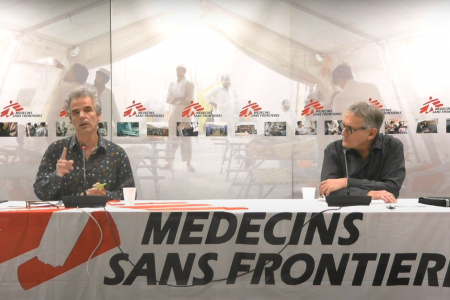 Conference
Conference
Clinical trials, between science and financial and academic interests
10/08/2020 - 06:00 PM 08:00 PM Pierre ChiracPierre Chirac, pharmacist and editor of the journal Prescrire, presented his analysis of the pharmaceutical industry's influence strategies and the special interests of university hospital researchers, their consequences on the reliability of drug information and the means now required to rectify a harmful situation.
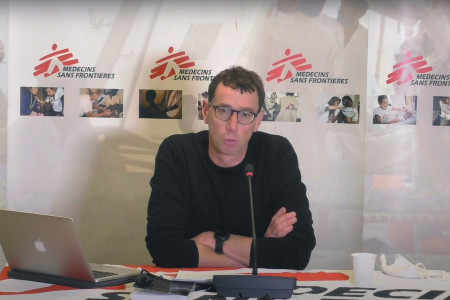 Conference
Conference
The quantification of needs
12/10/2020 - 06:00 PM 08:00 PM Joël GlasmanCombining historical research and ethnographic investigations, the Africanist historian Joël Glasman plunges us into the factory of the homo humanitarianus, the average individual, on the basis of which "needs" and aid projects today are assessed. This conversation took place on December 10th 2020, during a conference-debate at Crash.
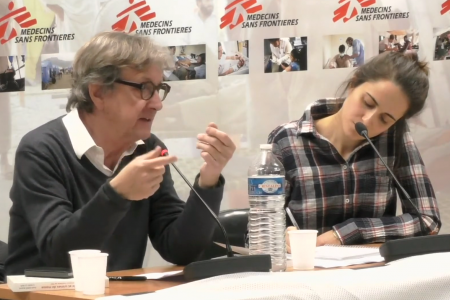 Conference
Conference
Territories: the illusion of identity
12/16/2019 - 06:00 PM 08:00 PM Jean-François BayartConference-debate on Monday 16 December 2019, 6-8pm in the 1st floor meeting room at MSF, 14-34 avenue Jean Jaurès 75019 Paris. Streaming and simultaneous translation into English available.
Can we talk about the specificities of the Middle East, Iran or the Mediterranean without reducing these territories to a culture or religion? On December 16, 2019, the CRASH team organised a conference-debate with Jean-François Bayart, a French political scientist who has devoted his work to the sociology of the State and identity illusions.
Période
Newsletter
Subscribe to our newsletter to stay informed about our latest publications. Interested in a specific author or thematic? Subscribe to our email alerts.
